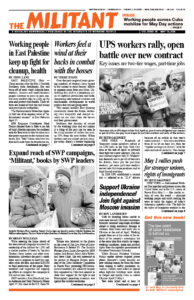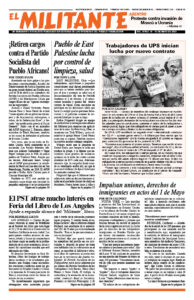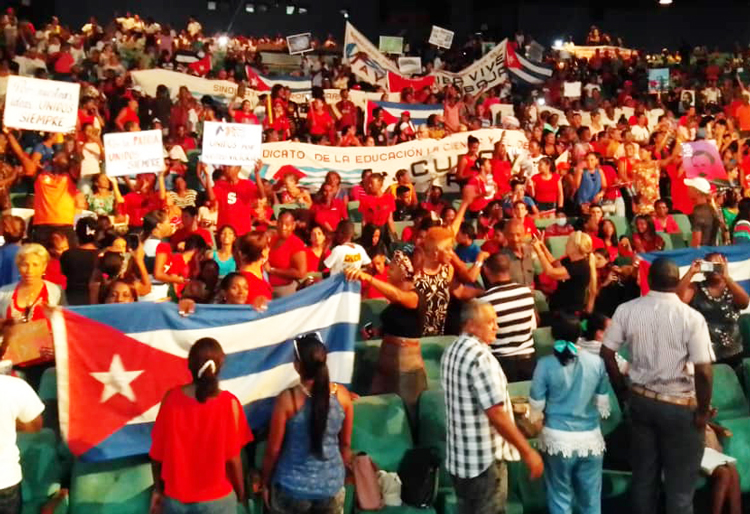HAVANA, May 1 — The capitalist media, from the New York Times to the Miami Herald to BBC, ran articles today proclaiming “Cuba cancels May Day parade” or something similar.
These assertions are false, as Militant reporters and others actually here in Cuba can attest.
Despite an acute fuel shortage — primarily a result of Washington’s relentless economic war against the Cuban Revolution — working people here and their revolutionary government are determined to celebrate International Workers Day.
Given a torrential downpour with heavy winds April 30 that caused flooding and damage in coastal areas, major events here and elsewhere today were postponed. The flooding included the Malecón, Havana’s oceanfront boulevard, where this year’s main rally is scheduled, instead of the traditional Plaza of the Revolution. The trade unions are preparing rallies for May 5 in cities, towns and rural areas across the island.
The big-business media in the U.S. and beyond normally chooses to ignore the May Day marches across Cuba — and for good reason. The annual actions are always a festive outpouring by millions, proudly marching in support of their socialist revolution. They highlight what Cuba’s workers and farmers accomplished in taking state power out of the hands of the capitalist class, transforming society in the interests of the toiling majority, and defending workers power for more than six decades against unceasing attacks by the U.S. imperialist rulers. This manifestation of the strength and achievements of Cuba’s working people sets a “dangerous” example for workers around the world, including in the U.S.
A week earlier, the Central Organization of Cuban Workers (CTC), the national trade union federation, announced that in face of the severe fuel crisis, the traditional large May Day marches in Havana and other cities would be reorganized, and, instead, local actions would be held in every municipality across the country. That would allow many residents to walk to a rally in their area, instead of relying on hundreds of buses to take people to a central gathering. The decision was widely welcomed by working people as a way to prioritize fuel for public transportation, already painfully reduced, and other social needs.
Over the past several weeks, the fuel shortage has led to mile-long lines at gas stations, with people spending two or more days waiting in their cars for the next delivery of gas.
In mid-April Cuban President Miguel Díaz-Canel addressed the immediate cause of the fuel shortage. The Cuban daily Granma reported his explanation that “countries with whom we have agreements for delivering gasoline have themselves faced a difficult energy situation and have been unable to fulfill their commitments.” Cuba’s biggest supplier of oil and gas has been Venezuela. Díaz-Canel noted that Cuba usually consumes 500 to 600 tons of fuel a day, but recently has only been able to import 400 tons or less.
Speaking to a conference sponsored by the CTC and the Cuban History Institute, CTC General Secretary Ulises Guilarte commented further on what he called “the very challenging situation” Cubans face today. “The intensification of the U.S. government’s 64-year-long hostile policies against Cuba is the main reason,” he explained. The impact on Cuba of U.S. sanctions is compounded by effects of the world capitalist economic crisis.
Guilarte pointed to the shortages of basic necessities hitting Cuban workers, not only fuel but flour, medicine, and other goods. While Cuba produces some of its own oil, it relies on fuel imports to meet its needs. The steep rise in world fuel prices has escalated the enormous drain on the country’s hard currency reserves.
The rescheduled May 5 events will include a variety of local activities, from rallies and marches to the giving of “National Vanguard” awards to outstanding workers.
Actions across Cuba
Political and cultural events “to salute May Day” have already been taking place. In the eastern province of Santiago de Cuba, for example, “rallies and parades have been held in rural communities and villages across the province, including El Cobre, El Caney, Boniato and El Cristo,” according to Trabajadores, the CTC newspaper.
In addition, events have been organized for international guests who are in Havana for the May Day activities. On April 29 the CTC and other mass organizations took international delegations to visit workplaces and meet residents of working-class neighborhoods across Havana. On May 1 nearly 300 visitors from the U.S. attended a meeting with President Díaz-Canel.
On May 2 some 1,000 unionists and members of political organizations from dozens of countries attended an international solidarity conference sponsored by the CTC and the Cuban Institute for Friendship with the Peoples (ICAP). It was addressed by Díaz-Canel, Guilarte, ICAP President Fernando González and other Cuban leaders.
The event highlighted actions projected in countries around the world to demand the U.S. government take Cuba off Washington’s spurious “State Sponsors of Terrorism” list and lift all economic sanctions and travel restrictions against Cuba.
Róger Calero and Bernie Senter contributed to this article.


